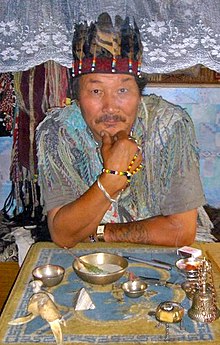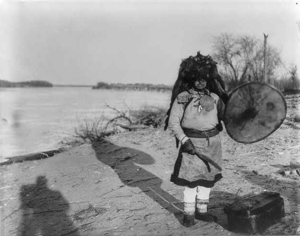
Back Sjamanisme Afrikaans شامانية Arabic شامانيه ARZ Xamanismu AST Şamanizm Azerbaijani شامانیزم AZB Шаманлыҡ Bashkir Šamanėzmos BAT-SMG Шаманізм Byelorussian Шаманізм BE-X-OLD


Shamanism is a practice where a practitioner reaches altered states of consciousness. Supposedly, the shaman perceives and interacts with a spirit world, and channels these energies into this world.[1]
A shaman is a person regarded as having access to, and influence in, the world of good and bad spirits. They usually enter into a trance state during a ritual, and do divination and healing.[2] To become a shaman, a person has to have had a near death experience (a "shamanic illness").[3]
The name "shaman" comes from the Evenki people in Siberia.[3]
Shamans play a central role in these movements, as they can be in both worlds, this one, and the world of spirits.
- ↑ Hoppál, Mihály 2007. Is shamanism a folk religion?. Shamans and Traditions, vol 13. Bibliotheca Shamanistica. Budapest: Akadémiai Kiadó. ISBN 978-963-05-8521-7
- ↑ Oxford Dictionary Online[permanent dead link].
- ↑ 3.0 3.1 Stern, David. "Shamans: Masters of Ecstasy". National Geographic. Archived from the original on 17 March 2016. Retrieved 25 February 2016.